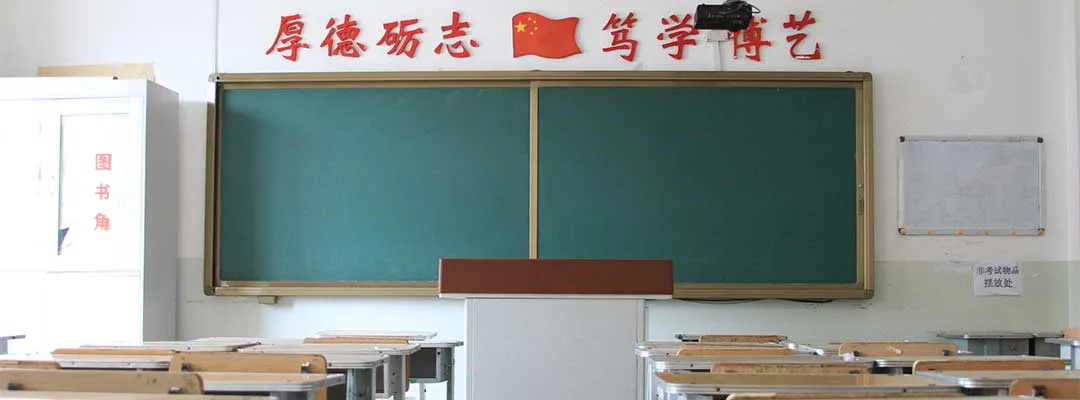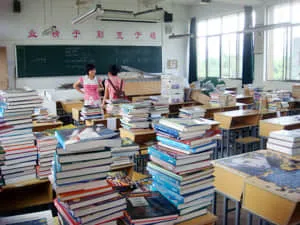High School in China

What does high school in China like?
Some people say that High School is the best years of your life.
Of course, that is unlikely to be said by someone who is still going through High School, but it is more likely to be said by a person who is already facing up to the realities of adult life and wishing they could return to the relatively carefree days of High School.
"High School is a lot of fun", said no one in China, ever.
It’s all about the big exam called the “gaokao” which students have to sit at the end of High School. In fact preparing for the exam is the reason why they spend those years in High School. Some people have said that whole idea of the exam is to purposely make life miserable for teenagers, but of course that is not true at all. China is such a massive country with an overwhelmingly huge population that there has to be some way of sorting out who is suitable to enter higher education and, eventually, who are the best people for the best jobs.
All through Primary School the little Chinese kids are already stressed as they are constantly reminded that they are being prepared for High School. They all graduate into Middle School, or Junior High, and then it’s time for the first important exam. This exam decides whether they even get into High School, and only 50% of students who finish Middle School go on to High School. Unlike Primary School and Middle School, High School is not free, and many students go to boarding schools further from home, hoping to be in a school that gives them the best opportunity for a high score in the big exam.
 High school classroom
High school classroom
The best thing about High School that many young people want to hang on to and remember – possibly for the rest of their lives – is the friendships. “BFF” or “Best Friends Forever” is a promise often made between students at High School in Western countries.
So you might think that Chinese students must also have High School friends in the same way – why on earth wouldn’t they? Considering that in the end all of their fellow students are their competitors in the big exam, some might feel that it would be foolish to trust anyone. For the very competitive students who are really feeling the pressure this might be a reason to limit their friendships.
 High school classroom
High school classroom
Of course it’s not really like that for everyone. Chinese kids are as keen on having friends as any other kids, especially as they mostly don’t have siblings. The problem for them is really a lack of time. They have no time for talking, for chatting, for playing, for hanging out. There are summer and winter holidays which are times when they don’t have to actually be at school. But that doesn’t mean they get to stop studying.
Over the three years of High School the schedule starts tough and gets tougher, time for sleep gets less and less. Classes start early and finish late. When there is no teacher present, students sit and memorise lists of facts. Meal times are short, and then they return to their books whether in the classroom or their bedroom or dormitory. Here is a typical schedule for a high school student in China: Typically they start at 7:20 am and finish at 10 pm. It will be even longer for junior year (final year of high school). Two hours for lunch and nap in the noon.
 High school students were taking the exam
High school students were taking the exam
You would think that at least on the weekends there would be a chance for some rest and recreation, but there isn’t. To start with they might get one weekend a month when they can go home to their parents – and study there. But by the final year this diminishes to once in 3 months that they get a day (not a whole weekend) to visit home. Any “free” time that they do get is quickly taken over with extra courses or tutoring.
In some countries you can get into a good tertiary institution based on your physical or sporting skills. Physical fitness is important for Chinese students too, and at the beginning of High School many of them spend two weeks in something like boot camp, with lots of regimented physical exercise. Unfortunately by the final year of High School PE is dropped in favour of exam preparation. If a young person has exceptional physical skills then maybe they can get selected and move out of the mainstream schooling into a special school for ping-pong, acrobatics, gymnastics, or even martial arts.
The mid-morning exercise sessions might continue for everyone with the students showing less and less enthusiasm for the movements as sleep deprivation takes its toll. Also twice a day many students are guided to do eye exercises in the classroom to keep them alert when the lessons are exceedingly boring and repetitive. The teachers generally stand at the front of the class and talk, and the only involvement the students have is when they are required to recite. There is no group work and no interesting problem-solving activities as in western High Schools.
So what is the big scary "Gaokao" all about? A bit like the SAT, or GCSE, or TEE / WACE in other countries, the results of this exam decide which (if any) tertiary institution a student will be eligible to attend. Although 90% of the students can attend university nowadays, but it is still very hard to be admitted into good universities, only about 6% can get into Project 211 & Project 985 Universities(national key universities) and only about 3.4% get into C9 League (Chinese equivalent of the US Ivy League). To get a good white collar job – as their family hope they will – they really need to graduate from a good university or college. Even if they get into a university and earn a degree, there is no guarantee that they will find a job appropriate to their qualifications.
Many schools have bulletin boards showing how that school’s scores compare with other schools, because of course that is how the value of a particular school is measured. And then there is also a sign declaring how many days are left before the next exam. It is meant to be motivating, but you can imagine for many students it would just feel scary to know how soon their future will be decided and they would never feel totally ready.
For students at High School in western countries one of the biggest distractions is the opposite sex. For Chinese students the feelings are no doubt there for many, but dating is forbidden, and the pressure from family and school administration is intense enough to make them conform to the rules.
Naturally everyone looks for ways to beat the system, to cheat on the test, especially when it feels like it might be the only possibility for them to succeed. However when it comes to the final big exam, things are very strict and very little cheating is allowed. The test runs for two or three days, and is held in a big hall or similar place with outside proctors.
Naturally there are always exceptions. Some families such as poor farmers in the countryside just don’t get a look in, the children never even make it into High School whether they want to or not. And some families are so rich that their teenage kids are not too bothered because they know that they could fit right into their parents’ business after muddling their way through school. These rich parents might also be able afford to send they children overseas to study where money can almost buy them a pass through university because the fees they pay subsidise the fees for local students. To bypass Gaokao, many well-off Chinese families find ways to obtain foreign passports for their children. A foreign passport allows these children to enjoy lower admission standards for overseas applicants in Chinese universities. But since June 2020, Chinese education authorities have ordered Chinese universities to tighten application requirements for students who have foreign passports but attend Chinese schools for most of their education.
So the next time you feel like complaining about High School, remember that you will look back at these as the best days of your life, unless you are a Chinese High School student.
